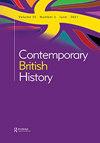《工党的邻居:重新定义拉姆齐街繁荣和从撒切尔到布莱尔的英国政治》
IF 0.5
2区 历史学
Q1 HISTORY
引用次数: 0
摘要
本文研究了两个重叠的现象:20世纪80年代末和90年代初,澳大利亚肥皂剧《邻居》在英国大受欢迎,以及工党在托尼·布莱尔领导之前未能成功发起选举挑战。它认为,“邻居”的吸引力——以社区为中心、友好、无阶级、不具威胁性、混合经济,以及在某些方面小的“c”保守——正是工党需要说服选民(尤其是妇女和那些住在郊区的人)的平台,而工党在1983年至1992年期间未能说服选民。《邻居》提供了一个想象和虚构的窗口,让人们了解鲍勃·霍克的澳大利亚,许多英国选民觉得这很有吸引力,但在工党获得这样的支持之前,大量的“流动选民”将继续支持社会民主党,随后支持约翰·梅杰的保守党。1990年12-15岁的年轻人中,10人中有8人无法在早期选举中投票,但在1997年布莱尔第一次以压倒性优势获胜时,他们及时加入了这个阵营。邻居当然不是影响这些选民的唯一因素,但却是有意义的因素。本文章由计算机程序翻译,如有差异,请以英文原文为准。
Labour’s Neighbours: reconceptualising the Ramsay Street boom and British politics from Thatcher to Blair
ABSTRACT This article considers two overlapping phenomena: the huge popularity of the Australian soap opera Neighbours in Britain during the late 1980s and early 1990s, and the failure of the Labour Party to mount a successful electoral challenge until the leadership of Tony Blair. It argues that Neighbours’ appeal—community focussed, friendly, classless, unthreatening, a mixed economy, and in some ways small ‘c’ conservative—was precisely the platform that Labour needed to convince voters (particularly women and those living in suburbs) that it failed to reach between 1983 and 1992. Neighbours offered an albeit imagined and fictionalised window into Bob Hawke’s Australia that many of the British electorate found attractive, but until the Labour party tapped into such support, significant numbers of ‘floating voters’ would continue to back the Social Democratic Party and, subsequently, John Major’s Conservatives. There were generational dynamics at play here—with the 8 in 10 12–15 year olds who watched the show in 1990 unable to vote at earlier elections, but joining the franchise in time for the first Blair landslide of 1997. Neighbours was of course not the only influence on such voters, but it was a meaningful one.
求助全文
通过发布文献求助,成功后即可免费获取论文全文。
去求助
来源期刊

Contemporary British History
HISTORY-
CiteScore
1.40
自引率
14.30%
发文量
34
期刊介绍:
Contemporary British History offers innovative new research on any aspect of British history - foreign, Commonwealth, political, social, cultural or economic - dealing with the period since the First World War. The editors welcome work which involves cross-disciplinary insights, as the journal seeks to reflect the work of all those interested in the recent past in Britain, whatever their subject specialism. Work which places contemporary Britain within a comparative (whether historical or international) context is also encouraged. In addition to articles, the journal regularly features interviews and profiles, archive reports, and a substantial review section.
 求助内容:
求助内容: 应助结果提醒方式:
应助结果提醒方式:


